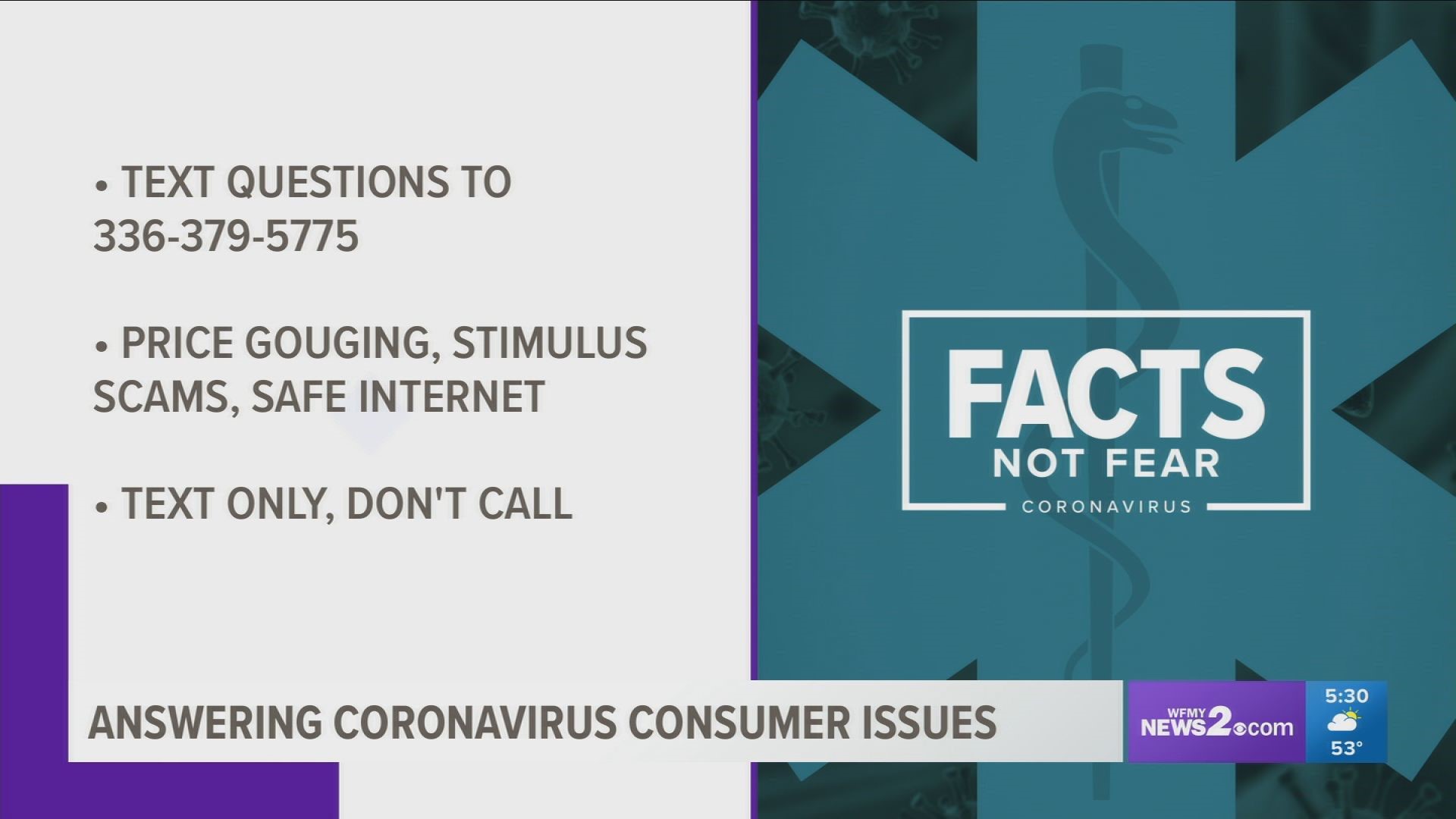Facts not fear. That's our goal when it comes to telling you information about the coronavirus.
Today, we talked to state Attorney General Josh Stein about several consumer issues you have had, because of the coronavirus.
The biggest issues Stein talked about were price gouging, robocalls, and how to make your home internet safer while working from home.
Price Gouging:
When Governor Roy Cooper declared a state of emergency, the state’s price gouging law went into effect.
Under the law, the Attorney General’s Office can stop price gouging buy any business or individual and get refunds for anyone who paid too much.
Since the law went into effect, the Attorney General's office has gotten 1,366 price gouging complaints. Most of them, are related to groceries.
Forsyth county was 3rd on the list of price gouging complaints, followed by Guilford county at 4th.
If you think you've seen a case of price gouging, you can report it here.
Evictions:
Due to a court order, evictions are not allowed at this time. All court proceedings for legal evictions are on hold. But that doesn't mean you don't have to pay your rent.
"There shouldn't be any evictions going on. that doesn't mean people don't owe their rent, it just means they can't be kicked out of their homes for non-payment. If the person hasn't made payment, the landlord can evict them when the order is lifted."
Stein recommends working with your landlord NOW to come up with a payment plan over the next few months. If your landlord is threatening you with immediate eviction, you can make a complaint with the NCDOJ and you can also get help from Legal Aid NC.
Robocalls:
Robocalls are annoying even when it's not during a pandemic.
Scammers are getting smarter with their robocalls related to the coronavirus. the Attorney General's office has heard everything from scammers saying you tested positive and need pills for a cure, or even saying your neighbor tested positive and they offer you to buy at-home test and solutions. Don't fall for this!
There are no at home tests or cures for the coronavirus. If you think you received a scam call, email, text, whatever it might be call (877)-5-NO-SCAM to report it.
If you get a robocall, hang up, and then report it on the Attorney General's website.
You can even stop robocalls all together by signing up on the do not call registry. Just remember, any legit business that you shop with is allowed to call you, unless you specifically tell that business to stop calling you.
Protecting your router:
Most of you are probably working from home.
Now it's more important than ever to make sure your home internet is as secure as possible, because hackers and scammers are working harder than ever to get your personally information and money.
The Attorney General's office put together a list of ways to upgrade your routers security, all while at home.
- Enter the IP address of your router into a web browser’s address bar. The IP address of each router is listed on the device or in the instruction manual. If you can’t find it, you can locate your device’s IP address through a simple web search.
- Enter your username and password. The login information for the router is typically found on the device or in the instruction manual.
- Locate the “Firmware” or “Router Upgrade” option. Usually, you can find this option in the Administration, Utilities, or Maintenance section. Keep in mind that the location of this option can vary depending on the router model.
- Download the update from your router manufacturer’s website. Typically, you can find the update in the Support section. Locate your router model and download the latest available update. Save the update to your computer.
- Upload the update to your router. In the Update section of your router, choose the “Browse” or “Choose File” button to upload your update. Once uploaded, start the update process. Once your router updates, it will restart with the new firmware installed.
You can take a closer look at the Attorney Generals recommendations here.
FACTS NOT FEAR
Remember facts, not fear when talking about the coronavirus. You should take the same measures recommended by health leaders to prevent the spread of the flu and other viruses. That means washing your hands, avoiding touching your face, and covering coughs and sneezes.
WHERE YOU GET INFORMATION ABOUT THE CORONAVIRUS IS IMPORTANT
It is important to make sure the information you are getting about the coronavirus is coming directly from reliable sources like the CDC and NCDHHS. Be careful not to spread misinformation about coronavirus on social media.
NC CORONAVIRUS HOTLINE
The state also has a special hotline set up where you can call 866-462-3821 for more information on the coronavirus. You can also submit questions online at ncpoisoncontrol.org or select chat to talk with someone about the virus.
You can also text keyword VIRUS to WFMY News 2 at 336-379-5775 to find out more information.


